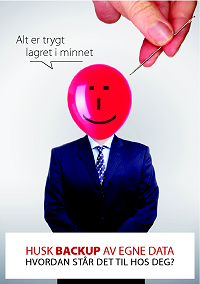Remember to backup your data!: Difference between revisions
No edit summary |
Removing categories that have no meaning. |
||
| (9 intermediate revisions by 2 users not shown) | |||
| Line 1: | Line 1: | ||
[[Image:Husk_backup_av_egne_data_stor_kuttet200px.png|frame|none||alt=alt| "Everything is safely stored in my memory"]] | [[Image:Husk_backup_av_egne_data_stor_kuttet200px.png|frame|none||alt=alt| "Everything is safely stored in my memory"]] | ||
== How much can you afford to lose? == | |||
== | |||
The basic idea behind backup is quite simple: | The basic idea behind backup is quite simple: | ||
How much can you afford to lose? | How much can you afford to lose? | ||
| Line 15: | Line 10: | ||
Take into account that your PC may fail or be stolen. Consider the situation that puts you in. | Take into account that your PC may fail or be stolen. Consider the situation that puts you in. | ||
== Your home directory - the safest place to store your data == | |||
All students and employees have a home directory on the UiB servers. On UiB PCs you can find this as "My documents" or drive O:\ on Windows or "home" on Linux. | All students and employees have a home directory on the UiB servers. On UiB PCs you can find this as "My documents" or drive O:\ on Windows or "home" on Linux. | ||
| Line 26: | Line 21: | ||
If you save your files arbitrarily on your PC, on an external hard drive or a memory stick, then the chances are greater for your documents to come in the wrong hands. | If you save your files arbitrarily on your PC, on an external hard drive or a memory stick, then the chances are greater for your documents to come in the wrong hands. | ||
== | |||
== Only copies on the flash drive - never the original == | |||
The use of flash drives has increased in the past. The number of support issues about defect flash drives has grown with it. In our experience, when the flash memory stick has a problem, the contents is very often lost. | The use of flash drives has increased in the past. The number of support issues about defect flash drives has grown with it. In our experience, when the flash memory stick has a problem, the contents is very often lost. | ||
| Line 32: | Line 28: | ||
Save your documents and files in your home directory, and keep only copies on the stick, never the original. | Save your documents and files in your home directory, and keep only copies on the stick, never the original. | ||
== | |||
== Contact us: == | |||
More information about safe data storage: | More information about safe data storage: | ||
| Line 41: | Line 38: | ||
The IT department’s helpdesk - BRITA | The IT department’s helpdesk - BRITA | ||
[[Category:File storage and backup]] | |||
[[Category:IT security]] | |||
Latest revision as of 13:34, 9 March 2017

How much can you afford to lose?
The basic idea behind backup is quite simple: How much can you afford to lose?
Imagine that the hard disk on your PC stops working. Or you discover that your PC is lost - stolen? What situation does that put you in? What are the consequences for you and your work? What are the costs?
Take into account that your PC may fail or be stolen. Consider the situation that puts you in.
Your home directory - the safest place to store your data
All students and employees have a home directory on the UiB servers. On UiB PCs you can find this as "My documents" or drive O:\ on Windows or "home" on Linux.
Save documents and files in your home directory. We take backup to ensure that lost or damaged documents and files can be restored.
Is access control important to you? Is it important that you are the only one who can read your UiB documents? Then the home directory is the place to save your data.
If you save your files arbitrarily on your PC, on an external hard drive or a memory stick, then the chances are greater for your documents to come in the wrong hands.
Only copies on the flash drive - never the original
The use of flash drives has increased in the past. The number of support issues about defect flash drives has grown with it. In our experience, when the flash memory stick has a problem, the contents is very often lost.
Save your documents and files in your home directory, and keep only copies on the stick, never the original.
Contact us:
More information about safe data storage: http://it.uib.no/backup
If you have questions or wish to talk to us about data security, call us at: 555 84700
The IT department’s helpdesk - BRITA
